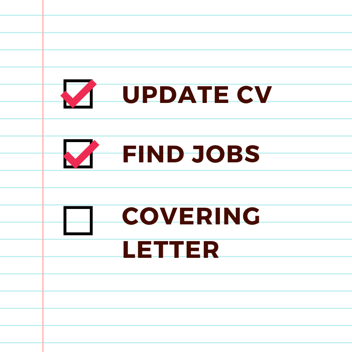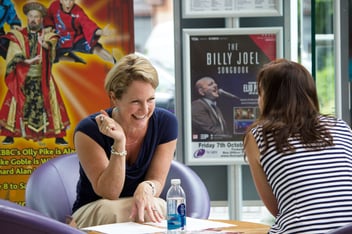How to Write A Cover Letter

When you’re applying for a job, remember that you’re being judged from the moment someone looks at your cover letter or supporting statement. That may be even before they have had a chance to glance at your CV, so knowing how to write a cover letter is very important. It’s not always right or fair, but often the cover letter is what will get your CV noticed. This is your chance to show that you’re really keen and ambitious – whether that’s about a role you’ve seen or a company you’d like to work for.
1. Think who will read your cover letter
 Always think about your audience when you’re writing a cover letter. Don’t just write, “Please put me forward for this role” and leave it at that. You need to sell yourself from the word go. When you write anything, always think of the intended recipient. Introduce yourself but make sure you reflect the business needs of the people you’re writing to. Try to inject energy and enthusiasm into the cover letter to help bring it – and you – to life. Our top tip is to try and to get across your enthusiasm for the role, which will energise the recruiter, e.g. “I was very excited when I saw the role advertised as it’s such a close match for my skills”.
Always think about your audience when you’re writing a cover letter. Don’t just write, “Please put me forward for this role” and leave it at that. You need to sell yourself from the word go. When you write anything, always think of the intended recipient. Introduce yourself but make sure you reflect the business needs of the people you’re writing to. Try to inject energy and enthusiasm into the cover letter to help bring it – and you – to life. Our top tip is to try and to get across your enthusiasm for the role, which will energise the recruiter, e.g. “I was very excited when I saw the role advertised as it’s such a close match for my skills”.
‘Whether the recruiter or client is junior or senior, they’re forming opinions about you throughout the whole recruitment process. So keep in mind your audience, behave as if you really want the job – and be yourself.” Deborah O’Sullivan, Co-Founder Ten2Two
2. Talk about yourself but pause
Yes, you should talk about how many years’ experience you have and in what discipline or area. But you don’t want to be too ‘me, me, me’, as this ignores the bigger business picture.We recommend that you balance your references to ‘I’ and ‘me’ with ‘you’, ‘your company’, ‘your organisation’. Naturally you have to talk about yourself, but again, check that each sentence puts the emphasis on the role and the company in question. Look at your language. How many times have you used the word ‘you’?
For example, “I would like to use my experience to help bring your business to the next level” is preferable to “I have lots of experience and a wide range of skills to offer”.
3. Be clear and concise
If your cover letter looks crowded or too long, it’s time to think again. Keep your sentences short – if they run over two lines, the chances are you need to break it down into two separate sentences. Separate your text out with frequent paragraphs and edit everything you write at least once.
4. Read your cover letter aloud
The top tip for anyone wanting to write clear, concise copy is to read their cover letter out loud. Do this and you’ll soon see where the errors are and where the language sounds forced and not quite right. If you stumble on a sentence, it might be worth having a look to see how you can improve it.
5. Cover Letter Structure
Firstly, your cover letter should introduce who you are and what you have to offer. Start your opening paragraph with a short introduction about yourself but always be thinking, ‘how does this make me sound like the best candidate for the role in question’?
For example, “I’m a designer with over twenty years’ experience” is fine. But “I’m a designer with over twenty years’ experience, largely in the telecommunications industry” is far better if you’re applying for a job with a mobile company.
Or if the job is in the retail industry, talk about the transferable skills you’ve developed in previous career roles. If you’ve completed a project in a similar field to the job specification you’re applying for, make sure you include this briefly in your covering letter. This is your chance to shine, so make sure you give the reader information that will really stand out.
Secondly, it should reflect an understanding of the role or opportunity you’re seeking or applying for. It’s a chance to show that you’ve done your homework on the role in question. Yes, you could show off some facts you’ve learned about the company you’re looking to join, but make sure you tie them into some relevant experience that you possess – and thereby help the reader to answer the question ‘why you?’. We also recommend that you balance your references to ‘I’ and ‘me’ with ‘you’, ‘your company’, ‘your organisation’. Naturally you have to talk about yourself, but again, check that each sentence puts the emphasis on the role and the company in question.
Thirdly, it should sign off confidently with a clear call to action. For example, “I look forward to hearing from you about the [type of] role.”
We can’t stress how important brevity can be. A covering email or letter needs to be short and sweet, otherwise your key messages could well be lost. Remember the reader! They will have lots of CVs on their desk, possibly just like yours.
5. When a cover letter isn’t required
If you’re not asked for a supporting statement, give a brief one anyway. This shows you’re really interested in the role rather than applying for everything that’s going.
Sometimes a job advert doesn’t allow room for a cover letter to be supplied. Application forms can often take the place of cover letters. All the same rules apply, you just have to format it into the boxes on the form. There is usually a box asking, ‘why are you interested in this position?’ or ‘what do you feel you could bring to the role?’.


 Back to resources
Back to resources 5 min read
5 min read








